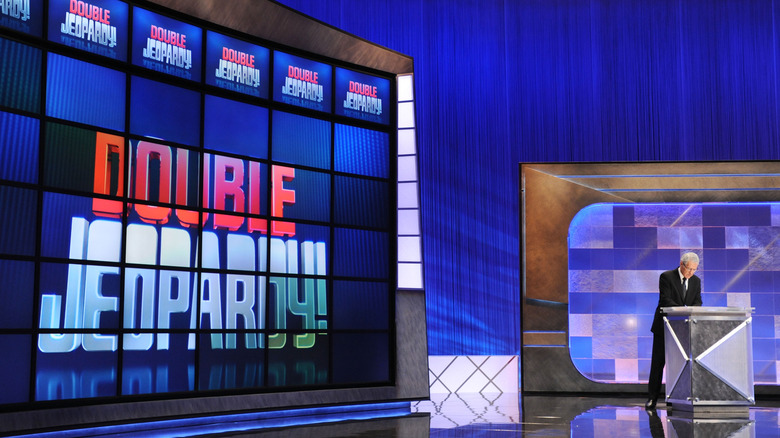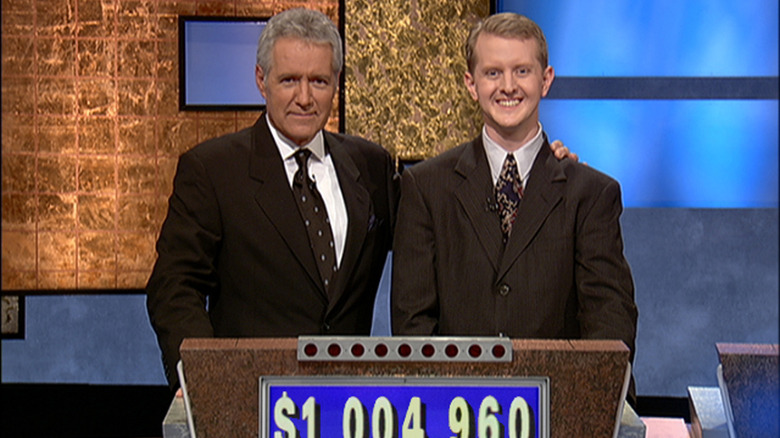The Surprising Rules You Didn't Know Jeopardy! Contestants Have To Follow
Are you the one all your friends turn to when they want to know the capital of Paraguay or the Best Picture Oscar winner in 2004? Do you have a faster thumb than a championship gamer? Does answering in the form of a question come easily to you?
Then you should try out for "Jeopardy!" if you haven't already. The fast-paced quiz show has been around for decades, and with good reason: It appeals to the teacher's pet in all of us; it's refreshingly gimmick-free; and it can potentially net you a small fortune and the chance to join the elite group of all-time champs like Ken Jennings, James Holzhauer, and Buzzy Cohen. Plus, you're bound to learn something every time you watch.
Yet trivia buffs might be surprised to know that it's anything but easy to become a "Jeopardy!" contestant. It's a long journey from at-home viewer to actually being on the show. It all begins with the audition process. Potential players can take an online test on the show's official website. (In-person regional tryouts haven't yet resumed post-COVID.) Those who pass may be called for an audition; currently, these are being held virtually. Do well on this tryout, and you'll be put into a contestant pool for 18 months. During that period, selected auditioners are contacted to be on the actual show. Didn't make the cut? You're free to go through the whole long process again.
Those lucky few who get to appear behind a "Jeopardy!" podium then have to follow other rules in the name of fairness and good TV.
"Jeopardy!" contestants don't know the clue categories in advance
Former "Jeopardy!" contestant Shannan Younger shared some inside info about the show with Better, including some of the rules and procedures contestants have to follow. For example, players have to pay their own travel expenses to attend the taping in California and have to stay at one of two approved hotels. Family members or friends are allowed to come along for moral support, but they have to come to the studio separately from the players.
The show tapes five days' worth of episodes in a single day. Contestants are asked to bring three changes of clothing in case they win and have to make it look as though time has passed between shows. They're advised not to wear tops that are all-white, olive, or a busy pattern, and women can't wear mascara, which can run if they sweat (via Good Housekeeping). At the studio, they sit in their own section of the audience, and they don't get to meet the "Jeopardy!" host until they're on stage. Even then, players only get to say a brief hello during the commercial break.
Players often study up on topics like history, geography, and literature in the weeks before their taping date, but they're not informed in advance of the categories that will be on their episodes. You may know everything about basketball and Roman architecture, but that won't help much if your game has topics like "Shakespeare's Villains" and "11-Letter Words."
Timing is everything when you play "Jeopardy!"
When you're watching "Jeopardy!" at home, it's easy to shout out the answers at the TV screen. Playing the game for real is a lot trickier. As former contestant Shannan Younger explains, after the host has finished reading the question, two lights on either side of the playing board light up (via Better). That's the cue for contestants to hit their buzzers. If they ring in too early, they're locked out for a fraction of a second, which leaves the other players free to answer. Getting that timing right can be difficult at first, especially with the added stress of being in front of the audience with cameras aimed at you.
As every "Jeopardy!" viewer knows, each answer has to be phrased in the form of a question — you lose money if you don't do so — but the actual wording of the question doesn't matter. 2021 champion Matt Amodio drove many fans crazy with his habit of saying "What's...?" even when the answer called for a "who" or "where." The show's producers finally had to address the issue on the show website, explaining that what's important is getting the facts of the answer correct (via Salon).
Spelling is another matter. A poorly spelled written response in the final round could cost a player the win. Back in 2013, a 12-year-old Kids Week player wrote "Emanciptation Proclamation" and was ruled incorrect by judges (via CNN). Fans were outraged — and so was the boy's father — but the decision was final.
The government gets to keep some of your winnings
Just being on "Jeopardy!" is a thrill, but winning some money doesn't hurt, either. How much will you walk away with? That all depends on how well you play and how strategically you bet. Many a player has ended up disappointed because they wagered big on a Daily Double and flubbed the answer or didn't bet enough of their earnings in the Final Jeopardy! round to beat their competitors' scores.
As Good Housekeeping explains, a "Jeopardy!" champion gets to keep all the cash they earn for as long as they play the game. For super-players like Ken Jennings, that can run into a whopping six figures. The second- and third-place contestants aren't quite so fortunate. Even if their final total is much higher, players only take home $2,000 for second place and $1,000 for third.
Players shouldn't plan for any big spending sprees right away, however. Game show winnings are subject to California tax, so a portion of that money goes to the government. Still, it's a small price to pay for the bragging rights of being a contestant on one of America's most beloved game shows.



